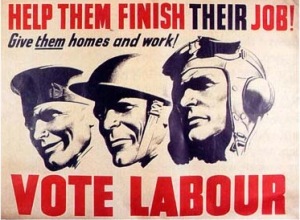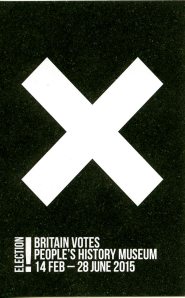After the success of POLLfest last year, we wanted to make POLLfest 2 bigger and better! We teamed up with some fantastic partners to deliver a week of events for Parliament Week 2014 to celebrate democracy at the home of ideas worth fighting for.
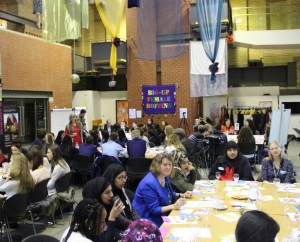 We kicked off on Friday 14 November with Democratic Dialogue: How young people would like to communicate with Parliament. We worked with the brilliant Democratic Society and welcomed over 60 young people, 3 MPs, 2 MEPs and 6 democratic experts to the museum. They sat down and discussed 4 topics that had been pre-selected by the young people: How do young people and politicians view one another?; E-petitions; Political and Democratic Education; and votes at 16. The very intense discussions threw up some really interesting points and we’re busy collating all the feedback. We’ll create a list of ways that will help improve the relationship between young people, politicians and parliament and publish it here.
We kicked off on Friday 14 November with Democratic Dialogue: How young people would like to communicate with Parliament. We worked with the brilliant Democratic Society and welcomed over 60 young people, 3 MPs, 2 MEPs and 6 democratic experts to the museum. They sat down and discussed 4 topics that had been pre-selected by the young people: How do young people and politicians view one another?; E-petitions; Political and Democratic Education; and votes at 16. The very intense discussions threw up some really interesting points and we’re busy collating all the feedback. We’ll create a list of ways that will help improve the relationship between young people, politicians and parliament and publish it here.
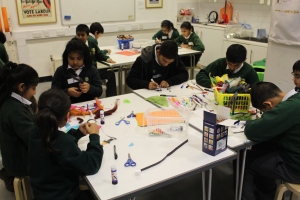 On Monday 17 November we welcomed pupils from Queensgate Primary, Brimrod Primary School and Roundthorn Primary Academy to The Power of Parliament. Wendy Lavin from Parliament’s Education Service gave a brilliant interactive Introduction to Parliament Talk (fact of the day: Michael Jackson wanted to buy the Queen’s gold throne in the House of Lords). The pupils then took part in three workshops –exploring our galleries to find out about the history of democracy, debating House of Commons-style and doing some creative consultation for our forthcoming Election! exhibition. The groups clearly had a great time making politicians!
On Monday 17 November we welcomed pupils from Queensgate Primary, Brimrod Primary School and Roundthorn Primary Academy to The Power of Parliament. Wendy Lavin from Parliament’s Education Service gave a brilliant interactive Introduction to Parliament Talk (fact of the day: Michael Jackson wanted to buy the Queen’s gold throne in the House of Lords). The pupils then took part in three workshops –exploring our galleries to find out about the history of democracy, debating House of Commons-style and doing some creative consultation for our forthcoming Election! exhibition. The groups clearly had a great time making politicians!
On Wednesday 19 November Gary Hart from the Parliamentary Outreach Team came to do a free workshop for adults and young people to explain how to Get Involved with Parliament. We learned how the House of Commons and the House of Lords work, and ways that you can help to influence policy, such as contacting your MP or submitting evidence to a select committee. A personal highlight was getting 10/10 in the Parliament quiz – working at the PHM definitely pays off sometimes!
https://twitter.com/PHMMcr/status/535083790897803264
We wrapped up the week with a Pecha Kucha night on the theme of Politics and the North. Five brilliant speakers each had 20 slides (with only 20 seconds for each slide) to whizz us through their specialist subjects:
https://twitter.com/PKNMCR/status/535494722786426881
https://twitter.com/PKNMCR/status/535496908694110208
https://twitter.com/PKNMCR/status/535499026662428672
https://twitter.com/PKNMCR/status/535501630872252417
https://twitter.com/PKNMCR/status/535505084906737664
We’d like to thank everybody who got involved in POLLfest including:
- Lucy Powell, MP for Manchester Central
- John Leech, MP for Manchester Withington
- Mike Kane, MP for Wythenshawe and Sale East
- Julie Ward, MEP for North West England
- Afzal Khan, MEP for North West England
- Helen Milner, CEO Tinder Foundation & Member of the Speaker’s Commission on Digital Democracy
- Rachael Farrington, Creator of votingcounts.org.uk
- Rachel Gibson, Manchester University
- Charlotte Mulcare, Democratic Society
- Oliver Sidorczuk, Policy Coordinator, Bite the Ballot
- Harriet Andrews, Uprising
- Manchester Enterprise Academy
- Mount St Joseph Business & Ent College
- National Children’s Bureau
- St Paul’s Catholic High School
- Upton Hall School
- William Hulme’s Grammar School
- Starting Point Community Learning Partnership
- Reclaim
- Wendy Lavin, Parliament’s Education Service
- Queensgate Primary
- Brimrod Primary School
- Roundthorn Primary Academy
- Gary Hart, Parlimentary Outreach Service
- Pecha Kucha Manchester and all the speakers
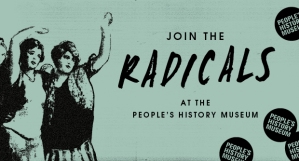 I’ve always loved the People’s History Museum, and feel that it has a unique place in the museums world, telling the story of democracy and representing real working people, rather than kings, queens and so on. So I was delighted to be commissioned by the museum to turn the huge support and goodwill it already has into financial support and funding. This is really important at a time when funding cuts threaten museums like PHM and we all need to find new ways to be resilient and carry on the good work museums do.
I’ve always loved the People’s History Museum, and feel that it has a unique place in the museums world, telling the story of democracy and representing real working people, rather than kings, queens and so on. So I was delighted to be commissioned by the museum to turn the huge support and goodwill it already has into financial support and funding. This is really important at a time when funding cuts threaten museums like PHM and we all need to find new ways to be resilient and carry on the good work museums do.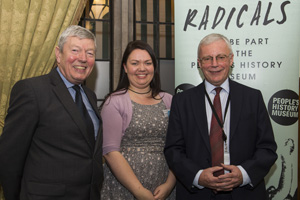 The campaign was launched on Monday 17 November at a reception at the House of Commons, with a special guest of honour, the Rt Hon Alan Johnson MP. Individuals, groups and organisations were invited to sponsor one of ‘100 Radical Heroes’ whose stories are uniquely told by the museum.
The campaign was launched on Monday 17 November at a reception at the House of Commons, with a special guest of honour, the Rt Hon Alan Johnson MP. Individuals, groups and organisations were invited to sponsor one of ‘100 Radical Heroes’ whose stories are uniquely told by the museum.

